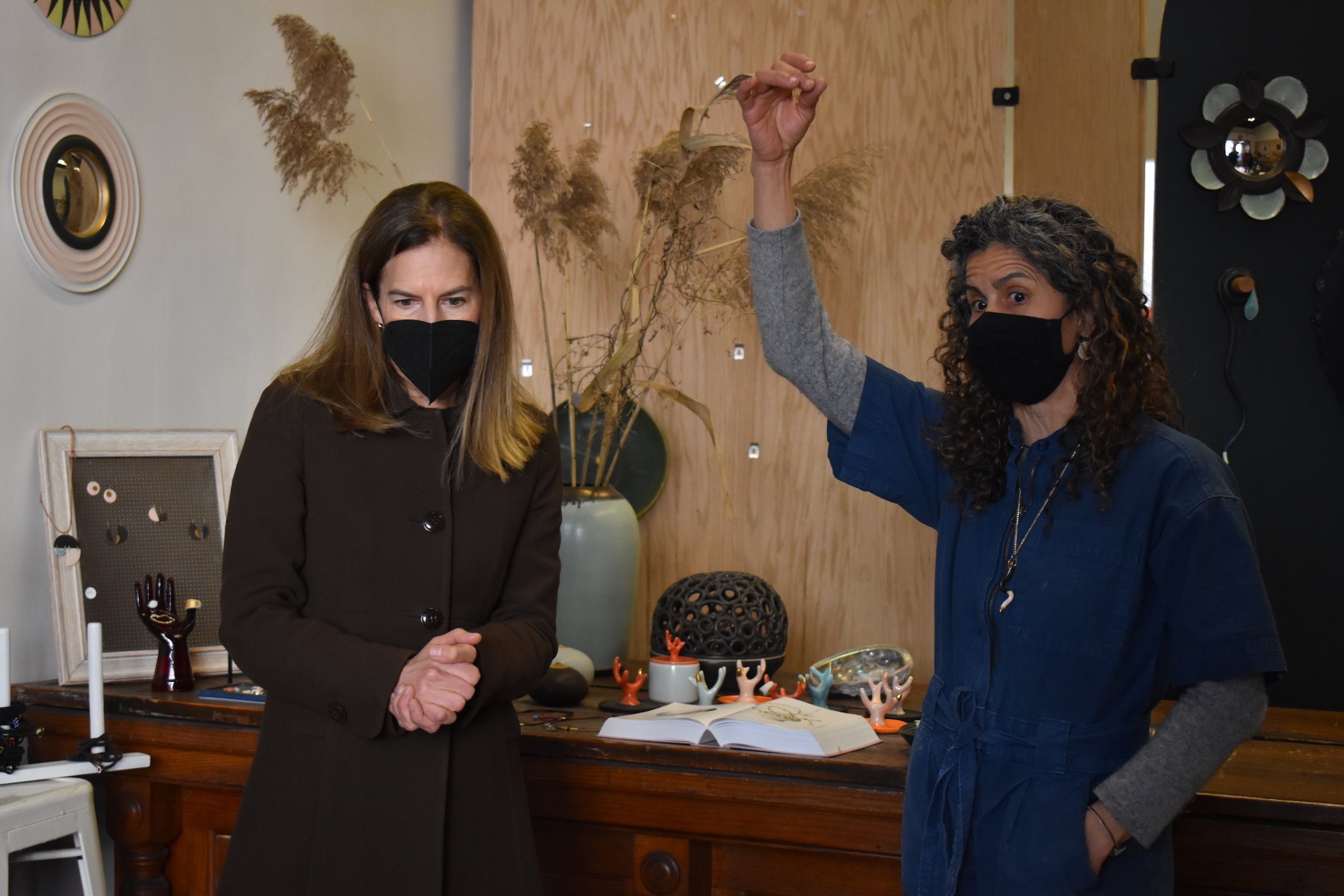
Lt. Gov. Susan Bysiewicz highlights clay artist Kiara Matos...

...and Havenly's Caterina Passoni and Nieda Abbas.
Checks delivered by Connecticut’s lieutenant governor are helping women entrepreneurs send off boxes of baklava and a flock of ceramic birds into New Haven.
The money comes through the Equity Match Grant program, a joint effort of the Connecticut Women’s Business Development Council (WBDC) and Lt. Gov. Susan Bysiewicz’s office involving stand private funding.
On Wednesday morning, Bysiewicz and WBDC representatives toured two New Haven businesses that benefited from recent grants: Kiara Matos’ new Orange Street gallery, and Havenly Treats up the block on Court Street.
The intiative has been offering local women-owned businesses grants ranging from $2,500 to $10,000 to help weather pandemic hurdles and support growth initiatives.
The grant started in 2020 in the wake of revelations that federal Paycheck Protection Program (PPP) loans, issued as the pandemic first started to keep small businesses afloat, benefitted overwhelmingly white and male-owned ventures. As the Hartford Courant reported, 84 percent of Connecticut businesses that received PPP loans were white-owned, and 78 percent were owned by men.
On Wednesday morning, Bysiewicz and WBDC representatives toured two New Haven businesses that benefited from recent grants.
Bysiewicz noted that women-owned businesses are particularly likely to benefit local economies. “Seventy cents of every dollar that someone spends in this store stays in this community,” she said
Grant recipient Kiara Matos has been making and selling ceramic vessels, dishes, sculptures, and other pottery by hand for 25 years. Four months ago, she moved into the studio on Orange Street, the front of which displays vibrant pieces for sale and the back of which functions as her workspace, with a wheel, molding space, and kiln.


Inside Kiara Matos Ceramics.
The Equity Match Grant has enabled Matos to invest in slip-casting and clay-mixing equipment that will allow her to produce her work on a larger scale. She said she frequently runs out of products that customers want to continue purchasing. “The amount of support is fantastic,” she said of the grant, adding that WBDC’s other programs and resources have also helped her grow her business.
Matos currently shapes every piece in the store by hand, an arduous, hourslong process that she says has prevented her from scaling up her business. Once she is able to create and reuse molds for her pieces, Matos plans to hire assistants to help her in the studio and to sell her work at more accessible rates.
“People want more than I can do on my own,” she said.
The clay-mixing equipment will help Matos bolster both the quality and the sustainability of her materials, she said. While she currently recycles unused scraps of clay by hand, a “pug mill” machine will make it easier to avoid wasting materials.
Not only is clay expensive, but we’re mining the land for it,” she said.

Matos with a molded clay bird.
Matos has already created a mold for one of her popular products: a clay bird on a wooden pedestal. “I have a flock of them” in New Haven already, she said. When she makes the birds by hand, each one takes about 5 hours to shape.
Recently, to test out a new molding process, Matos produced a clay prototype of the bird by hand, and then slip cast a plaster mold around it.

Once the plaster dried, she used the mold to shape clay into another bird, identical to the prototype. After the firing process, the molded bird emerged slightly smaller than the prototype, having shrunk in the heat.
Next, Matos hopes to make molds in different shapes to produce a variety of birds.

The mold-making process won’t affect the artistry of the work, Matos said. Her glazing technique, using her characteristic color palette and minimalist style, makes each piece personal. She added that she’s excited to bring more people into her business, and to have other voices filling the studio each day.
The mold process will also allow her to sell each piece for a more accessible price. While handmade birds currently sell for $250, a molded bird will cost around $150, Matos said.

Havenly's Caterina Passoni and Nieda Abbas.
Bysiewicz and WBDC also visited Havenly Treats: a refugee-run cafe that has filled its Temple Street storefront with the aroma of baklava and falafel since 2020.
After the most recent wave of the pandemic slowed in-person business, Havenly received $9,000 from the Equity Match Grant to develop a gift box series containing various combinations of vegan baklava, date bites, jam, and other pastries. The gift boxes, which range from $14 to $50 in price, serve as one more way for customers to share Havenly’s food without dining inside the store.

The grant allowed Havenly to print detailed information about the venture both on its website and inside the gift boxes. The boxes tell the story of Havenly’s Head Chef, Nieda Abbas, and her journey as an Iraqi refugee starting a business in New Haven.
Proceeds from the gift box are re-invested into the job training, financial literacy, and language classes that Havenly provides for local refugee women pursuing restaurant careers.
The Equity Match Grant program is designed for businesses with over 50 percent female ownership. Bysiewicz said that about a third of grant recipients so far have been women of color. So far, 98 businesses have received a total of $924,000 in grants. The program has undertaken five rounds of applications so far, and will reopen applications later in the spring.

Bysiewicz, Abbas, Passoni, and WBDC's Kenyetta Banks.